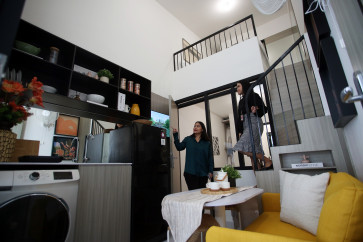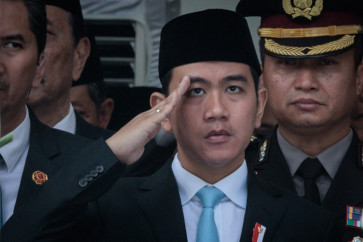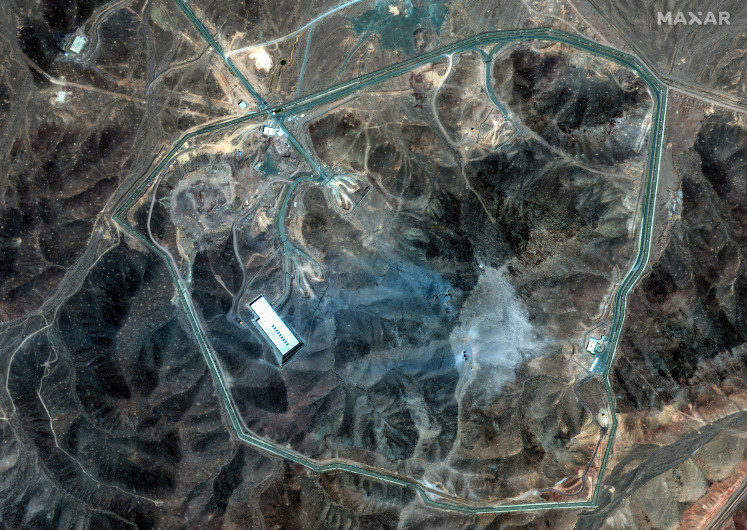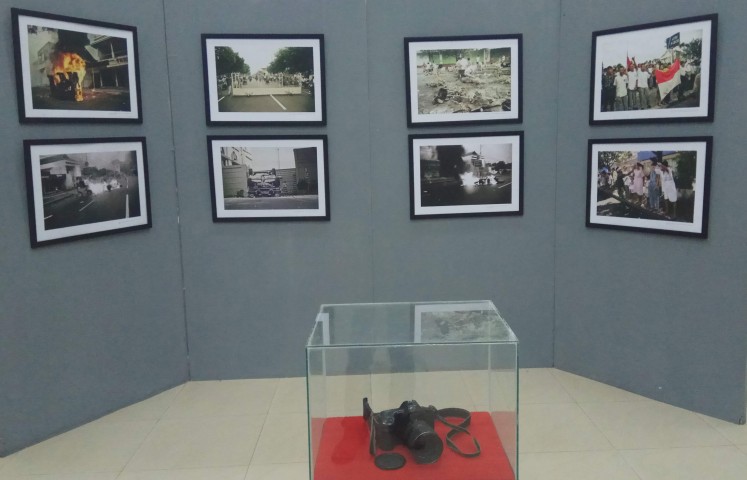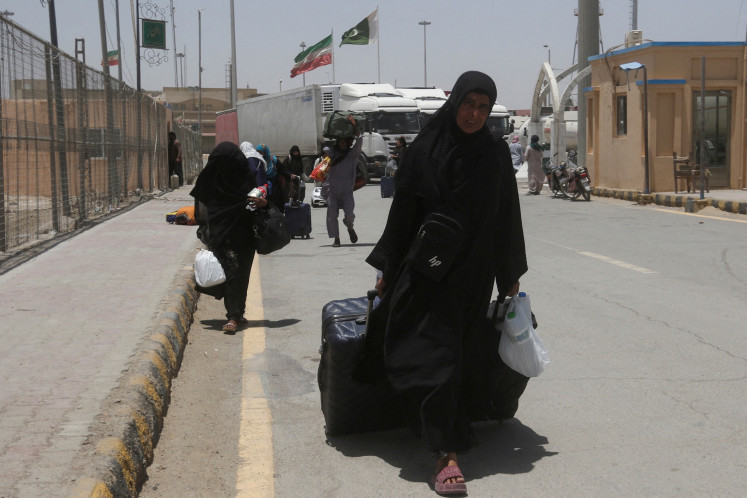Popular Reads
Top Results
Can't find what you're looking for?
View all search resultsPopular Reads
Top Results
Can't find what you're looking for?
View all search results20 questions: Ernest Prakasa talks comedy behind the scenes
With two Citra Awards on his mantel, the 40-year-old Jakarta native is living proof that a stand-up comic can successfully cross over to the realm of cinema.
Change text size
Gift Premium Articles
to Anyone
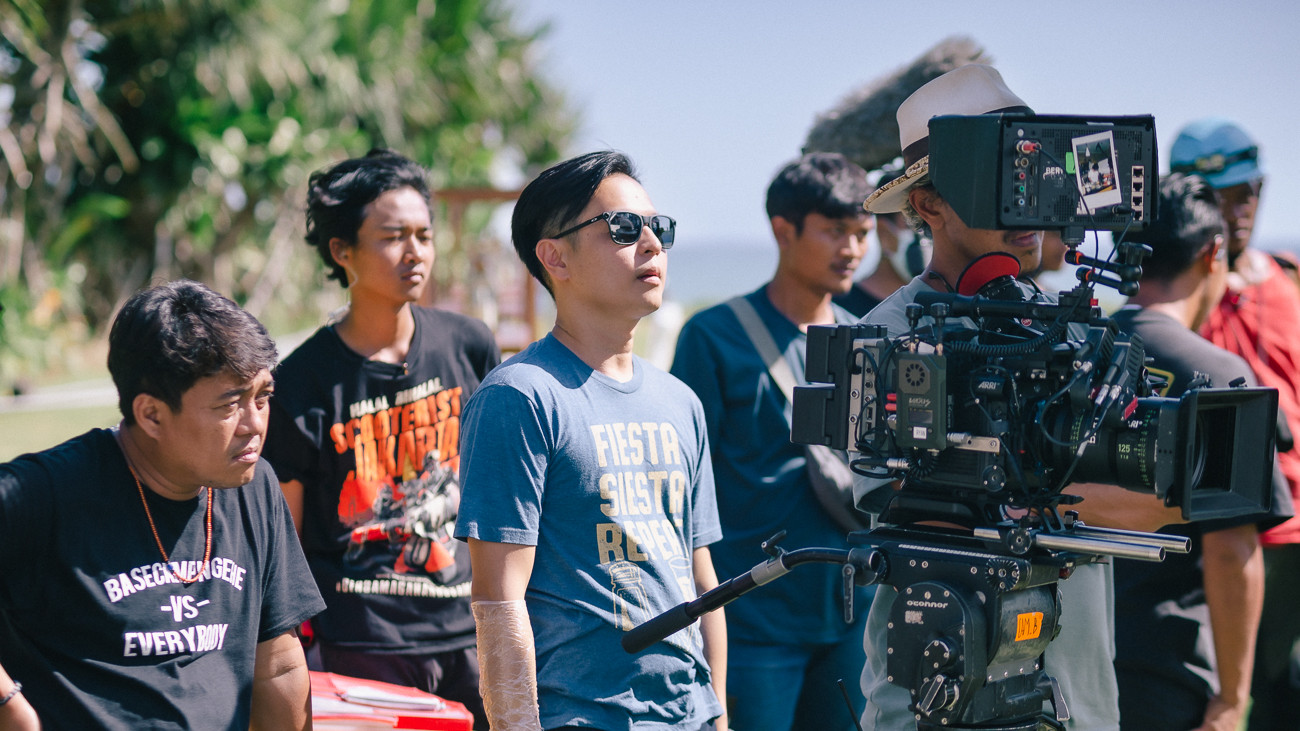
20 questions is a column where we interview some of the country’s most intriguing artists, celebrities, academics, activists, leaders and industry players, as well as ‘regular’ people who have made notable achievements.
With the launch of his film production house Imajinari, the commercial success of its first feature film Ngeri-Ngeri Sedap, which received five nominations at this year's Indonesian Film Festival, and the announcement of the sequel to his acclaimed family comedy Cek Toko Sebelah, Ernest Prakasa seems to have cemented himself as one of the most prolific actors, comedians, directors, writers and producers of 2022 and beyond.
With two Citra Awards on his mantel, the 40-year-old Jakarta native is living proof that a stand-up comic can successfully cross over to the realm of cinema.
You turned 40 in January. What has it been like so far?
It was tough at first, but as I’ve gone on, I have gotten the hang of it. I used to feel shocked whenever I was reminded that I'm already 40. I was like, "Huh?" But, slowly, I was like, “Oh, well. That means I'll be 50 in 10 years” [laughs]. I was totally overthinking it, but the changing milestone from being a 30-something to being a 40-something felt completely like poles apart. Like, "Just accept your fate of being called 'Sir'. You're in your 40s anyway."
Let's take a walk down memory lane for a second. Do you remember when you realized you were funny?
I think it was back in primary school. I was a typical class clown. I always made my friends laugh. When I do something and my friends laugh afterward, I feel excited about it. I tasted that sort of sensation back when I was in primary school. My father, who is an avid comedy lover, also helped cultivate it. I grew up with comedy tapes that he loved to play. And then, [Indonesian broadcast television network] RCTI came on with its sitcoms and I got to enjoy comedy more. I never felt like, "Oh, I'm funny!" Instead, it was like, "Oh, making people laugh is fun!"
The Stand Up Comedy Indonesia community, which you cofounded, has reached its 11th-year milestone this year. What has it been like to watch this community grow and flourish for more than a decade now?
There were no expectations at all. Everything happened so fast. We established this community not on purpose – we just wanted to build a platform that introduced this fresh form of art that, as it turns out, would draw so much interest. When we established this community, I had no idea who [Indonesian comedian and writer] Raditya Dika was. I only knew [Indonesian comedian and filmmaker] Pandji Pragiwaksono because he and I used to work in radio broadcasts in Bandung back in college, though on different radio stations.
Indonesian youth have started taking an interest in what stand-up comics have to say when it comes to the sociopolitical, hot-button issues of the country. How do you feel about that?
Historically, artists have always been the voice of reason – because an artist harbors no political agenda whatsoever. Dating back to when stage comedy was born in the ancient Greek era, comedy was meant to laugh at a given situation. It was terrifying to criticize the powers-that-be, so better off doing some parody on the stage and goofing off. In my personal opinion, though, a comedian can and should bear the responsibility of having an active role in society.
There are two different types of comedian: by profession and by artistry. We see a lot of comedians on television, but we can't expect them to have the same positioning as the comedians who take to the stage because the former is expected to play it safe by the television industry and that's just part of the deal – regardless of how funny or how clever those comedians are.
For the other comedians, though – especially the ones with their own YouTube content and such – it's their responsibility to do their part. What kind of education can we impart to the audience? When today’s youth are gullible, and easily manipulated by political campaigns -- by either the government or the opposition -- can we be the voice of reason for them?
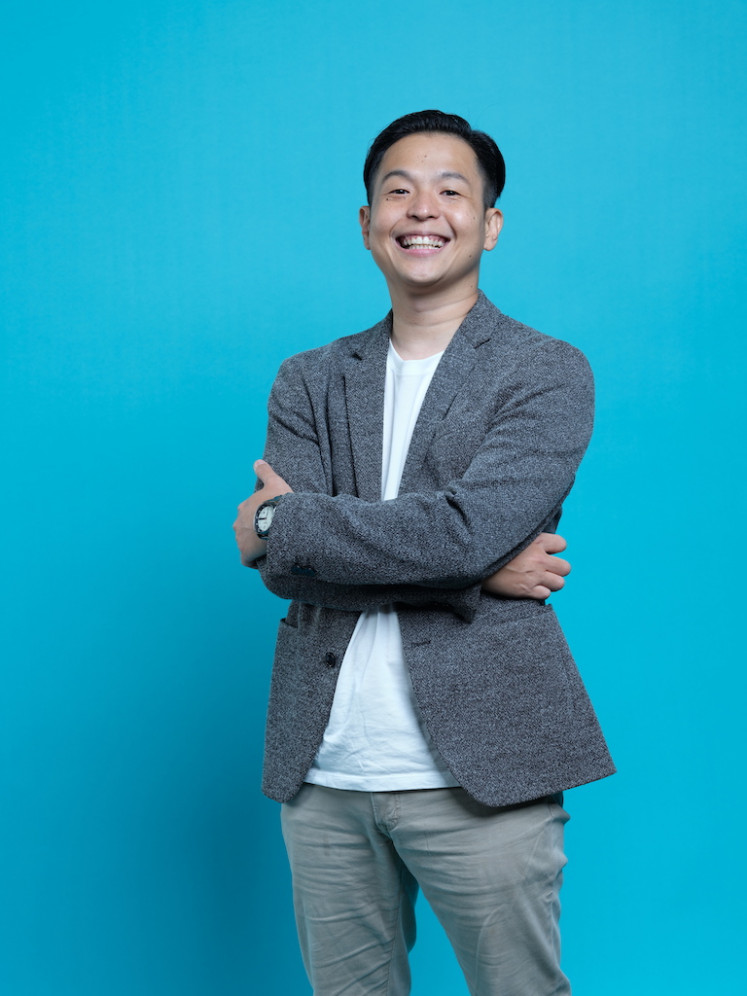
What happens when a fellow comedian – say, Pandji Pragiwaksono – has a different political perspective from yours?
I would engage him in a discussion. His answers might not necessarily make sense to me, but differences in political perspective do not necessarily tear apart friendships. Some things are simply a matter of dynamics, but some things are just intolerable for me. There are fellow comedians with whom I'm, like, "Okay, I can no longer tolerate you if you decide to stand on that ground. We should mutually respect each other, but we shouldn't be friends."
Of all the emerging comedians at the moment, who has impressed you the most?
His name is Aji Pratama. He caught my attention because not a lot of comics out there consistently deliver politically charged jokes. And then there's Bintang Emon. If I have to pick a comedian whom I respect the most – outside of Pandji Pragiwaksono and everything he has done for us – that would be Bintang Emon. He understands that his fiery barbs could cost him his job and his welfare, but he's not afraid of losing those things. A comedian who came from a humble beginning, then suddenly found himself on top of the world, but is not afraid of losing it all – I haven't seen anyone like that. You've got to admire his guts.
Considering that the presidential campaign season has commenced, do you have anything planned, comedy-wise?
Actually, I do miss doing stand-up. The problem is, as an artist, I feel like the world of filmmaking is so exciting. Here's the thing. As a stand-up comic, you would need at least an hour and fifteen minutes or an hour and a half worth of material. I mean, to deliver a solid output worth 30 minutes on stage is already difficult. It's such hard labor, and I'm currently channeling that same energy into the filmmaking process. I'm having fun learning how to produce, how to direct and how to run a production house.
Of all the feature films you have taken a part in – as an actor, director, producer or writer – which one are you most proud of?
It's hard not to choose [2016 family comedy film] Cek Toko Sebelah. As an artist, I would choose [2019 romantic comedy] Imperfect: Karier, Cinta & Timbangan, though when it comes to a film's impact, it's hard not to choose Cek Toko Sebelah. That film opened everyone's eyes that comedy could sell tickets as well. That film also encouraged producers to have more faith in stand-up comics. The film's impact went all over the place, and Cek Toko Sebelah opened my eyes to the fact that filmmaking was what I wanted to do for the rest of my life. It's a feeling that I don't get to experience when I do stand-up.
Speaking of Cek Toko Sebelah, could you describe how your Chinese-Indonesian heritage shaped you as a comedian?
That's the thing, though. I don’t think the correlation is that tight. Cek Toko Sebelah is about a Chinese-Indonesian family, but that has nothing to do with how comedy works because comedy is rooted in my background as a comedian and not my being a Chinese-Indonesian. Regardless of ethnicity, as stand-up comics, we learn about the techniques first. How do my comedy films work? Because, before I'm a filmmaker, I'm a comedian.
Not all filmmakers can understand that, though. They'd watch Cek Toko Sebelah and be, like, "I think I can make something like this", but it's not that easy. Why? Because comedy is very fragile. If you're not a comedian, you won't understand the building blocks.
The more philosophical answer, though, is whether you're telling a story of a Chinese-Indonesian family or a Batak family, at the end of the day, the bridge between the story and the audience should be built upon the relatability of the essence of the conflict and the characters.
What can you tease about Cek Toko Sebelah 2?
Honestly, Cek Toko Sebelah 2 is a project that I never wanted to give birth to. I have always felt that making a sequel is hard and, regardless of the output, people would easily judge that the first one is better. People have had this embedded notion in their heads that a sequel is just another money grabber or an attempt to capitalize on intellectual property. Since 2016, I have told [the film's producer] Chand Parwez Servia, "Pak, let's not do the sequel. Let's make something new instead."
Then, COVID-19 happened. In early 2022, right after we wrapped up [2021 mystery dramedy] Teka-Teki Tika, we started discussing what we would do next. The cinema situation, at the time, was still looking grim. We needed something. If it were a war, we would need the biggest weapon in our arsenal. In my case, it was Cek Toko Sebelah.
We hoped Cek Toko Sebelah 2 would create enough traction for the audience to return to theatres – something that, in retrospect, was not necessary because, as it turns out, theatres ended up bouncing back so fast! [laughs] What I tried to do with Cek Toko Sebelah 2 was dive into the complexities of the characters. Which sides of Koh Afuk did we have yet to see? The same goes for Erwin and Yohan. Also, Ayu and Natalie, who were peripheral in the first film, will be given weightier roles.
It's not every day you take part in a dramatic project such as 2016's Rudy Habibie directed by Hanung Bramantyo. What motivated you to join that biopic?
I just wanted to visit Germany for free [laughs]. Look, there were two reasons I did the film. First, I have always admired Hanung Bramantyo. I think he's a magnificent director. Second, I had never been outside Asia before [laughs]. So, when Hanung invited me to make a film in Germany, even though the film was all drama and no comedy, I was, like, "No worries!"
Of course, it was harder to do a drama. First, it was my first time getting to know Reza Rahadian. I used to watch his films and suddenly, I became his best friend [in Rudy Habibie] so I was, like, "Holy crap!" Thank goodness he's a friendly guy. Second, it was my first time doing something that was not a comedy at all, so I learned a lot. Third, I couldn't stand the cold weather [laughs].
Sometime in the future, would you be open to working on dramatic projects again?
I would say, "Never say never," but it's a long shot. Why? As an audience member, I'm not into watching drama films that are so dramatic. Take [2008 American drama] The Curious Case of Benjamin Button, for instance. My wife and I watched it, and I fell asleep! I was a film audience member way before I became a filmmaker. I enjoy watching films, but dramatic ones are just not my cup of tea.
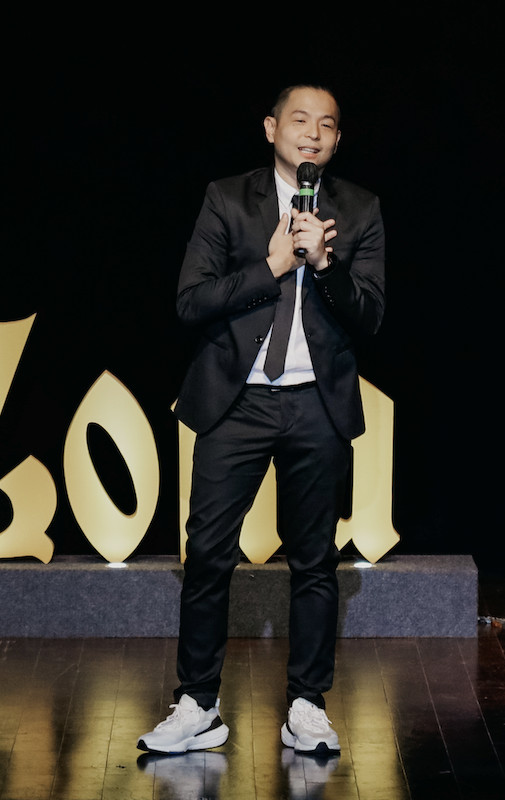
Is there any actor or director or writer you wish you could collaborate with in the future?
There's one actor at the top of my wish list: Putri Marino. There's a quality in an acting performance that, for me, is difficult to achieve, which is believability – when you believe in this character and what they are going through, the conflict they are facing, what they feel and what they say. Putri, I think, is on an almost flawless level. I have always enjoyed her performances. I believe that she is her character, and that makes me admire her so much and wish I could work with her someday. She was such a standout in [2021 Indonesian family drama] Losmen Bu Broto.
You recently launched your own film production house, Imajinari – with 2022 film Ngeri-Ngeri Sedap as its first feature film. What was the motivation behind this creative venture?
It was because I wanted freedom. I used to work under the same production house for eight years and seven films – not to mention the series that I produced and many more. Even though I enjoyed the creative process very much, to a certain degree, compromise was a must. Making concessions when it comes to creativity and ideas is a must when you work as a team. However, I reached the point where I felt like it was time for me to take up my own space and manifest my own vision.
Ngeri-Ngeri Sedap is now available to watch on Netflix. Are you team streaming or team theater?
Do we have to split them into teams? [Laughs] I feel that streaming has saved the film industry during the pandemic, and I feel that streaming and theaters can go hand in hand. Is this too naïve considering streaming has – rumor has it – eroded American theatres? I don't know. However, I'm still hopeful that both can go hand in hand.
Looking at recent sociocultural shifts, the definition of what is funny has changed as well. Case in point, the character Naryo from Cek Toko Sebelah may be perceived as a dig at people of different sexualities. How do you now draw the line between what is funny and what is offensive?
There is a certain degree of woke-ness that didn't exist before. Up to my third film, I didn't forbid sexist jokes. In 2018, I had a better understanding and banned sexist jokes. Naryo, I think, is a character that doesn't make fun of effeminacy. He's not the butt of the joke.
Naryo will be there in the sequel of Cek Toko Sebelah. Am I being more careful now? Yes. But there's no way I overhaul the character. It's the jokes that I tried to pay attention to. Like, am I making fun of his identity or not? However, being the character that he is, especially knowing he's beloved by so many people, the risk is always there.
Where do you draw the line? For me, one thing is for sure: Jokes that objectify women are a hard pass. However, when it comes to jokes relating to men being effeminate – on the flip side, I think that reflects our daily lives. We have friends who are hilarious for how they behave, so it's not necessarily something offensive for me. But we'll see what happens – will this draw backlash or not?
Do you think the present woke culture helps or hurts comedians?
It's such a mess. We have to walk a very thin line now, and it's very strenuous. We have to be very, very careful. There are lots of positives coming from the woke culture, but specifically for comedians, we find ourselves with so many catch-22 situations. Comedians' legroom has gotten more restricted – especially in the age of social media. When it's a paid, off-air event, you can be as free as you want. But, once things get public on social media, you better brace yourself. Don't let anything slip [that could be considered] reckless.
Which film or series have you watched recently that made you laugh out loud?
[American superhero series] The Boys. It can be very funny sometimes [laughs]. The jokes are dark, but hilarious!
What kind of joke always makes you laugh and, conversely, what kind of joke makes you cringe?
Slapstick has become cringe now, but only because the slapstick era has passed. It's not that I frown upon slapstick; it's in your arsenal, but you can't rely on it anymore. Just like human civilization, comedy has also evolved.
How would you describe Indonesians' sense of humor?
Our sense of humor is very diverse. Culturally, Indonesians are very different, and we have the richness of laughing at ourselves based on our respective ethnic traits. That's why, before ‘woke’ culture happened, [1980s Indonesian comedy troupe] Warkop used to be so hilarious. Now, it's all about sensitivity, even though lots of jokes out there are not offensive at all.
It's a different era now, and like it or not, we have to embrace it. Times are changing, and we can't fight it.

